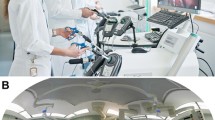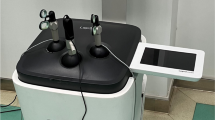Abstract
Background
Virtual reality simulators combined with head-mounted displays enable highly immersive virtual reality (VR) for surgical skills training, potentially bridging the gap between the simulation environment and real-life operating room conditions. However, the increased complexity of the learning situation in immersive VR could potentially induce high cognitive load thereby inhibiting performance and learning. This study aims to compare cognitive load and performance in immersive VR and conventional VR simulation training.
Methods
A randomized controlled trial of residents (n = 31) performing laparoscopic salpingectomies with an ectopic pregnancy in either immersive VR or conventional VR simulation. Cognitive load was estimated by secondary-task reaction time at baseline, and during nonstressor and stressor phases of the procedure. Simulator metrics were used to evaluate performance.
Results
Cognitive load was increased by 66% and 58% during immersive VR and conventional VR simulation, respectively (p < 0.001), compared to baseline. A light stressor induced a further increase in cognitive load by 15.2% and a severe stressor by 43.1% in the immersive VR group compared to 23% (severe stressor) in the conventional VR group. Immersive VR also caused a significantly worse performance on most simulator metrics.
Conclusion
Immersive VR simulation training induces a higher cognitive load and results in a poorer performance than conventional VR simulation training in laparoscopy. High extraneous load and element interactivity in the immersive VR are suggested as mechanisms explaining this finding. However, immersive VR offers some potential advantages over conventional VR such as more real-life conditions but we only recommend introducing immersive VR in surgical skills training after initial training in conventional VR.




Similar content being viewed by others
Notes
Videos as online content: https://youtu.be/-PJKZJz6cc0 (calm phase), https://youtu.be/COtp3x0MWoI (light stressor), https://youtu.be/LqNV8euKTxM (severe stressor), https://youtu.be/TEAdtLBbixE (full procedure).
References
Gallagher AG, Ritter EM, Champion H, Higgins G, Fried MP, Moses G et al (2005) Virtual reality simulation for the operating room: proficiency-based training as a paradigm shift in surgical skills training. Ann Surg 241:364–372
Reichenbach DJ, Tackett AD, Harris J, Camacho D, Graviss EA, Dewan B et al (2006) Laparoscopic colon resection early in the learning curve: what is the appropriate setting? Ann Surg 243:730–735. https://doi.org/10.1097/01.sla.0000220039.26524.fadiscussion 5-7
Watson DI, Baigrie RJ, Jamieson GG (1996) A learning curve for laparoscopic fundoplication. Definable, avoidable, or a waste of time? Ann Surg 224:198–203
Kasotakis G, Lakha A, Sarkar B, Kunitake H, Kissane-Lee N, Dechert T et al (2014) Trainee participation is associated with adverse outcomes in emergency general surgery: an analysis of the National Surgical Quality Improvement Program database. Ann Surg 260:483–490. https://doi.org/10.1097/sla.0000000000000889discussion 90-3
Varas J, Mejía R, Riquelme A, Maluenda F, Buckel E, Salinas J et al (2012) Significant transfer of surgical skills obtained with an advanced laparoscopic training program to a laparoscopic jejunojejunostomy in a live porcine model: feasibility of learning advanced laparoscopy in a general surgery residency. Surg Endosc 26:3486–3494. https://doi.org/10.1007/s00464-012-2391-4
Zendejas B, Cook DA, Bingener J, Huebner M, Dunn WF, Sarr MG et al (2011) Simulation-based mastery learning improves patient outcomes in laparoscopic inguinal hernia repair: a randomized controlled trial. Ann Surg 254:502–509. https://doi.org/10.1097/sla.0b013e31822c6994discussion 9-11
Nagendran M, Gurusamy KS, Aggarwal R, Loizidou M, Davidson BR (2013) Virtual reality training for surgical trainees in laparoscopic surgery. Cochrane Database Syst Rev. https://doi.org/10.1002/14651858.cd006575.pub3
Sirimanna P, Gladman MA (2017) Development of a proficiency-based virtual reality simulation training curriculum for laparoscopic appendicectomy. ANZ J Surg 87:760–766. https://doi.org/10.1111/ans.14135
Moorthy K, Munz Y, Adams S, Pandey V, Darzi A (2005) A human factors analysis of technical and team skills among surgical trainees during procedural simulations in a simulated operating theatre. Ann Surg 242:631–639
Huber T, Paschold M, Hansen C, Wunderling T, Lang H, Kneist W (2017) New dimensions in surgical training: immersive virtual reality laparoscopic simulation exhilarates surgical staff. Surg Endosc 31:4472–4477. https://doi.org/10.1007/s00464-017-5500-6
van Merrienboer JJ, Sweller J (2010) Cognitive load theory in health professional education: design principles and strategies. Med Educ 44:85–93. https://doi.org/10.1111/j.1365-2923.2009.03498.x
Cowan N (2014) Working memory underpins cognitive development, learning, and education. Educ Psychol Rev 26:197–223. https://doi.org/10.1007/s10648-013-9246-y
Choi H-H, van Merriënboer JJG, Paas F (2014) Effects of the physical environment on cognitive load and learning: towards a new model of cognitive load. Educ Psychol Rev 26:225–244. https://doi.org/10.1007/s10648-014-9262-6
Kulasegaram KM, Grierson LE, Norman GR (2013) The roles of deliberate practice and innate ability in developing expertise: evidence and implications. Med Educ 47:979–989. https://doi.org/10.1111/medu.12260
de Jong T (2010) Cognitive load theory, educational research, and instructional design: some food for thought. Instr Sci 38:105–134. https://doi.org/10.1007/s11251-009-9110-0
Dargar S, Kennedy R, Lai W, Arikatla V, De S (2015) Towards immersive virtual reality (iVR): a route to surgical expertise. J Comput Surg. https://doi.org/10.1186/s40244-015-0015-8
Schulz KF, Altman DG, Moher D (2011) CONSORT 2010 statement: updated guidelines for reporting parallel group randomised trials. Int J Surg 9:672–677. https://doi.org/10.1016/j.ijsu.2011.09.004
Konge L, Ringsted C, Bjerrum F, Tolsgaard MG, Bitsch M, Sorensen JL et al (2015) The Simulation Centre at Rigshospitalet, Copenhagen, Denmark. J Surg Educ 72:362–365. https://doi.org/10.1016/j.jsurg.2014.11.012
Brunken R, Plass JL, Leutner D (2003) Direct measurement of cognitive load in multimedia learning. Educ Psychol 38:53–61. https://doi.org/10.1207/s15326985ep3801_7
Rojas D, Haji F, Shewaga R, Kapralos B, Dubrowski A (2014) The impact of secondary-task type on the sensitivity of reaction-time based measurement of cognitive load for novices learning surgical skills using simulation. Stud Health Technol Inform 196:353–359
Naismith LM, Cavalcanti RB (2015) Validity of cognitive load measures in simulation-based training: a systematic review. Acad Med 90:S24–S35. https://doi.org/10.1097/acm.0000000000000893
Haji FA, Rojas D, Childs R, de Ribaupierre S, Dubrowski A (2015) Measuring cognitive load: performance, mental effort and simulation task complexity. Med Educ 49:815–827. https://doi.org/10.1111/medu.12773
Naismith LM, Cheung JJ, Ringsted C, Cavalcanti RB (2015) Limitations of subjective cognitive load measures in simulation-based procedural training. Med Educ 49:805–814. https://doi.org/10.1111/medu.12732
Gianaros PJ, Muth ER, Mordkoff JT, Levine ME, Stern RM (2001) A questionnaire for the assessment of the multiple dimensions of motion sickness. Aviat Space Environ Med 72:115–119
Andersen SA, Mikkelsen PT, Konge L, Caye-Thomasen P, Sorensen MS (2016) Cognitive load in mastoidectomy skills training: virtual reality simulation and traditional dissection compared. J Surg Educ 73:45–50. https://doi.org/10.1016/j.jsurg.2015.09.010
Andersen SAW, Konge L, Sorensen MS (2018) The effect of distributed virtual reality simulation training on cognitive load during subsequent dissection training. Med Teach. https://doi.org/10.1080/0142159x.2018.1465182
Ali A, Subhi Y, Ringsted C, Konge L (2015) Gender differences in the acquisition of surgical skills: a systematic review. Surg Endosc 29:3065–3073. https://doi.org/10.1007/s00464-015-4092-2
Haji FA, Cheung JJ, Woods N, Regehr G, de Ribaupierre S, Dubrowski A (2016) Thrive or overload? The effect of task complexity on novices’ simulation-based learning. Med Educ 50:955–968. https://doi.org/10.1111/medu.13086
Andersen SA, Mikkelsen PT, Konge L, Caye-Thomasen P, Sorensen MS (2016) Cognitive load in distributed and massed practice in virtual reality mastoidectomy simulation. Laryngoscope 126:E74–E79. https://doi.org/10.1002/lary.25449
Abelson JS, Silverman E, Banfelder J, Naides A, Costa R, Dakin G (2015) Virtual operating room for team training in surgery. Am J Surg 210:585–590. https://doi.org/10.1016/j.amjsurg.2015.01.024
Sankaranarayanan G, Li B, Manser K, Jones SB, Jones DB, Schwaitzberg S et al (2016) Face and construct validation of a next generation virtual reality (Gen2-VR) surgical simulator. Surg Endosc 30:979–985. https://doi.org/10.1007/s00464-015-4278-7
Johnson L, Adams Becker S, Cummins M, Estrada V, Freeman A, Hall C (2016) NMC horizon report: 2016 higher education edition. The New Media Consortium, Austin
Nararro-Haro MV, Hoffman HG, Garcia-Palacios A, Sampaio M, Alhalabi W, Hall K et al (2016) The use of virtual reality to facilitate mindfulness skills training in dialectical behavioral therapy for borderline personality disorder: a case study. Front Psychol 7:1573. https://doi.org/10.3389/fpsyg.2016.01573
Lofaro RJSK (2009) Civil aviation: flight simulators and training. In: DA Vincenzi WJ, Mouloua M, Hancock PA (eds) Human factors in simulation and training. CRC Press, Boca Raton, pp 257–286
Schmorrow DND, Lackey SJ, Allen RC, Norman K, Cohn J (2009) Virtual reality in the training environment. In: Vincenzi DAWJ, Mouloua M, Hancock PA (eds) Human factors in simulation and training. CRC Press, Boca Raton, pp 201–228
Bekelis K, Calnan D, Simmons N, MacKenzie TA, Kakoulides G (2017) Effect of an immersive preoperative virtual reality experience on patient reported outcomes: a randomized controlled trial. Ann Surg 265:1068–1073. https://doi.org/10.1097/sla.0000000000002094
Sweller J (1999) Instructional design in technical areas. ACER Press, Camberwell
Acknowledgements
The authors would like to thank the following for their help in producing the 360o videos: Fanny Klara Karolina Kullberg, Mai Homburg, and Christoffer Skov Olesen for their portrayal of the staff in the operating room; Helle Skovgaard and Lars Bo Svendsen for their help in precuring a location for the recording of the videos; and Absolute Zero© for their help in recording and processing the videos.
Author information
Authors and Affiliations
Corresponding author
Ethics declarations
Disclosures
Joakim Grant Frederiksen, Stine Maya Dreier Sørensen, Lars Konge, Morten Bo Søndergaard Svendsen, Morten Nobel-Jørgensen, Flemming Bjerrum, and Steven Arild Wuyts Andersen have no conflicts of interest or financial ties to disclose
Additional information
Publisher's Note
Springer Nature remains neutral with regard to jurisdictional claims in published maps and institutional affiliations.
Rights and permissions
About this article
Cite this article
Frederiksen, J.G., Sørensen, S.M.D., Konge, L. et al. Cognitive load and performance in immersive virtual reality versus conventional virtual reality simulation training of laparoscopic surgery: a randomized trial. Surg Endosc 34, 1244–1252 (2020). https://doi.org/10.1007/s00464-019-06887-8
Received:
Accepted:
Published:
Issue Date:
DOI: https://doi.org/10.1007/s00464-019-06887-8




